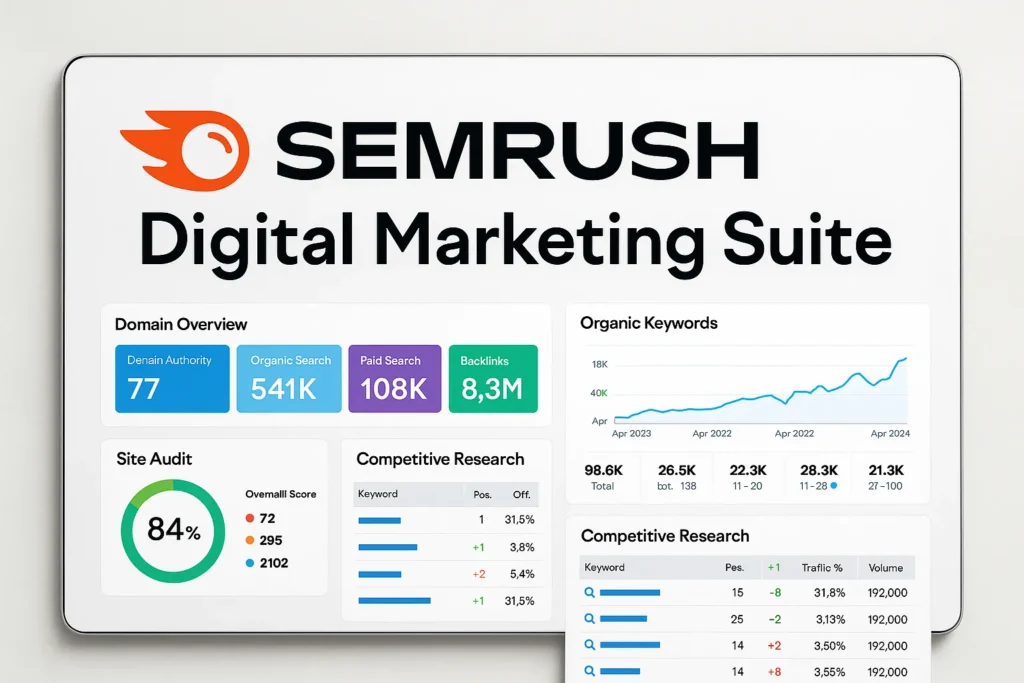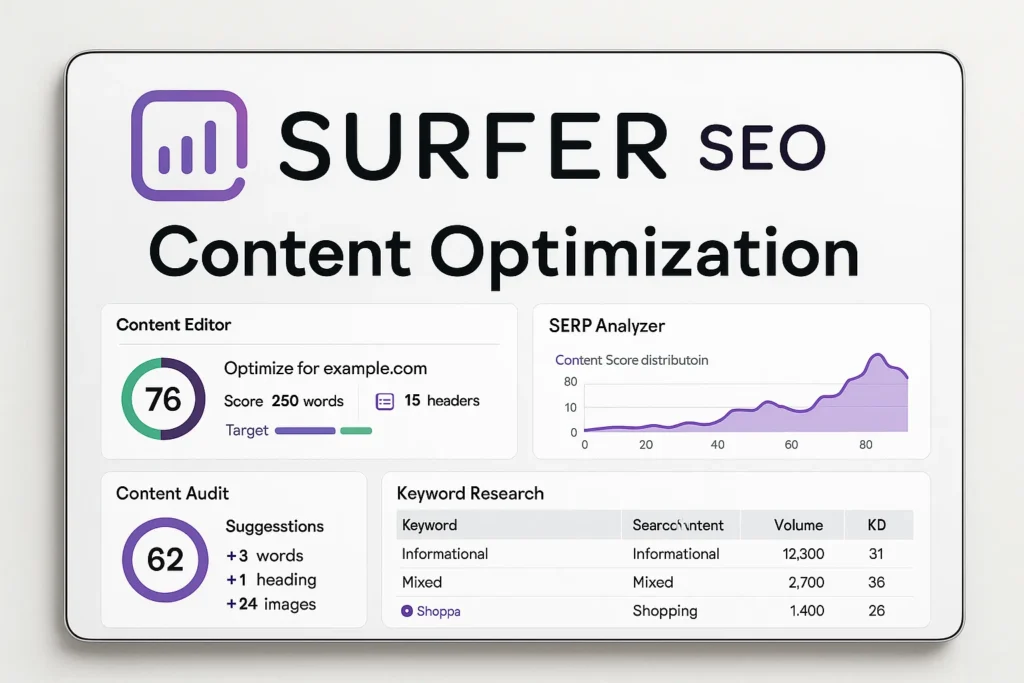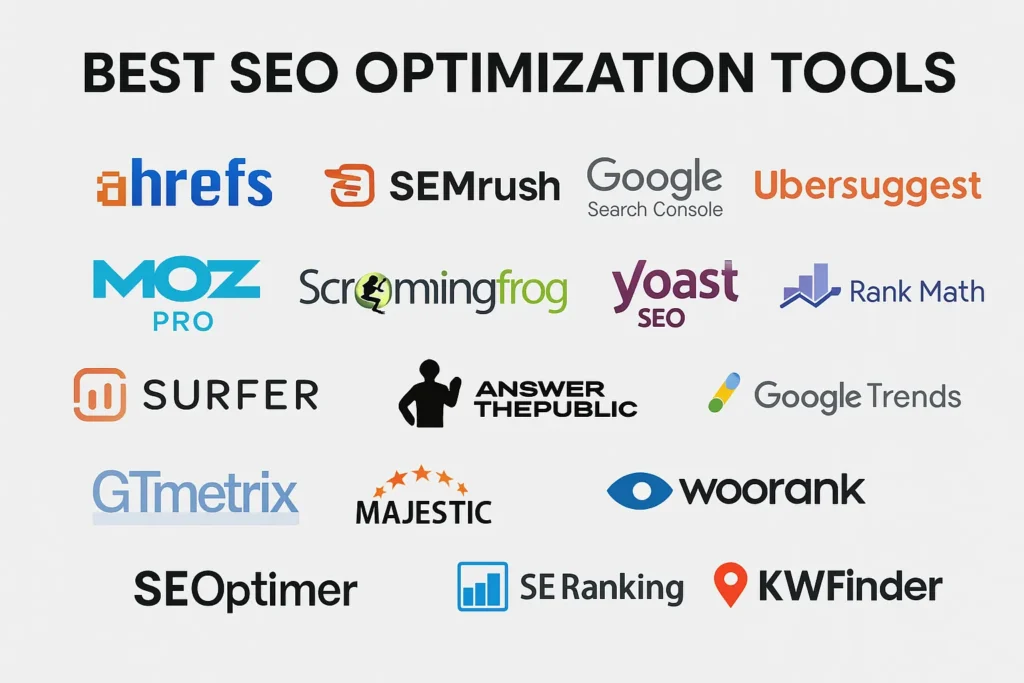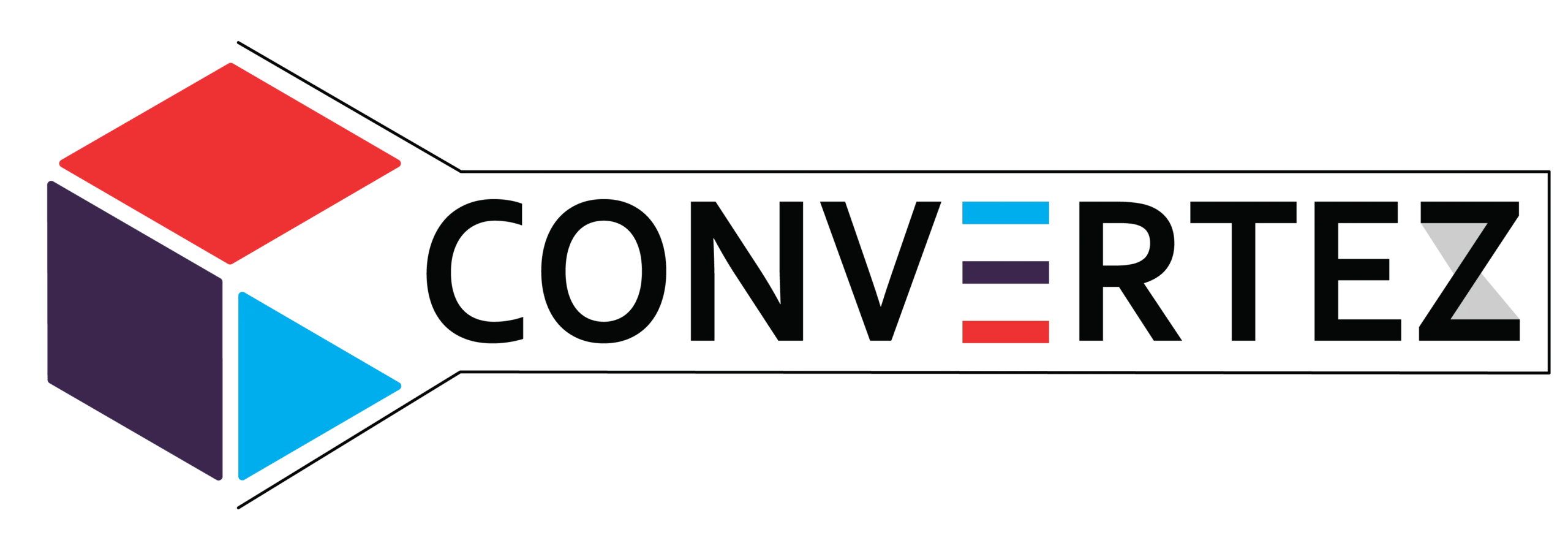Introduction:
In 2025, being visible on Google is not optional—it’s survival. If your content isn’t optimized for search engines, you risk being buried under millions of results. That’s where the best SEO optimization tools come in. These tools aren’t just fancy add-ons—they are essential allies that analyze, track, and elevate your SEO strategy.
This guide covers 17 of the best SEO optimization tools, each selected for their ability to drive real results. We’ll look at both the positives and negatives so you can make the right choice without wasting time or money.
1. Ahrefs—Comprehensive SEO Toolkit
Ahrefs is known as one of the best all-in-one SEO tools for backlink analysis, keyword tracking, and content research.
Pros:
- Industry-leading backlink analysis
- Accurate keyword data
- Competitive gap analysis
Cons:
- Expensive for beginners
- Complex dashboard for new users
Why does it qualify as one of the best SEO optimization tools? It provides rich insights for building high-authority backlinks and ranking effectively.
2. SEMrush – Digital Marketing Suite
SEMrush offers over 40 tools, including keyword tracking, site audits, competitor analysis, and content marketing tools.
Pros:
- Excellent competitor spying
- Robust keyword research
- All-in-one toolkit
Cons:
- Learning curve
- Pricey for solo entrepreneurs

3. Google Search Console – Free Must-Have
This free tool by Google is essential to monitor performance, fix indexing issues, and understand keyword behavior.
Pros:
- 100% free
- Direct data from Google
- Easy error tracking
Cons:
- Limited backlink data
- No keyword suggestions
Still, it remains one of the best SEO optimization tools because it tells you how Google sees your website.
4. Ubersuggest – Budget-Friendly Option
Neil Patel’s Ubersuggest is great for beginners and offers keyword ideas, traffic estimations, and basic audits.
Pros:
- Affordable
- Beginner-friendly
- Keyword overview & suggestions
Cons:
- Less accurate than premium tools
- Limited daily searches in free version
5. Moz Pro—Trusted SEO Brand
Moz offers domain authority metrics, keyword explorer, and on-page optimization tips.
Pros:
- MozBar browser extension
- Good for link building
- Intuitive user interface
Cons:
- Not as deep as Ahrefs or SEMrush
- Fewer updates in recent years
6. Screaming Frog – Technical SEO Analyzer
Screaming Frog is a desktop-based crawler used to audit site structure and technical SEO errors.
Pros:
- Identifies broken links, redirects, duplicate content
- Exportable reports
Cons:
- Limited UX
- Can be overwhelming without SEO knowledge
7. Yoast SEO – WordPress Optimization King
Yoast is the most-used SEO plugin for WordPress websites.
Pros:
- Focus keyword targeting
- On-page readability analysis
- Meta and schema generation
Cons:
- Over-optimization risk if misused
- The premium version offers real power
8. Rank Math—Yoast’s Rising Rival
Among the best SEO optimization tools using WordPress, Rank Math is quickly becoming the favorite WordPress plugin due to its AI suggestions and automation features.
Pros:
- The free version is powerful
- Built-in schema
- Fast UI
Cons:
- Still maturing in some advanced features
- Needs time to understand fully
9. Surfer SEO – Content Optimization Expert
Surfer SEO focuses on content strategy by analyzing top-ranking pages for your keyword.
Pros:
- Real-time content score
- NLP optimization
- Google Docs integration
Cons:
- Requires external keyword tools
- Can get expensive

10. AnswerThePublic – Keyword Questions Tool
This tool visualizes questions users ask about a topic, ideal for content ideation.
Pros:
- Unique question format
- Great for NLP-rich content
Cons:
- Limited free usage
- Visualization may overwhelm
11. Google Trends – Identify Emerging Topics
Google Trends gives you real-time access to trending queries.
Pros:
- Free and dynamic
- Seasonal trend analysis
Cons:
- Limited keyword depth
- Best used with other tools
12. GTmetrix – Speed Optimization Helper
Website speed affects SEO. GTmetrix helps diagnose loading issues.
Pros:
- Core Web Vitals checker
- Visual waterfall breakdown
Cons:
- Doesn’t offer SEO tips directly
- Requires interpretation
13. Majestic – Backlink Focused
Majestic focuses specifically on backlink metrics like Trust Flow and Citation Flow.
Pros:
- Unique backlink scoring
- Link history tracking
Cons:
- Not ideal for keyword research
- UI feels dated
14. Woorank—Quick SEO Reports
Woorank gives instant site reviews, keyword rankings, and social metrics.
Pros:
- Fast SEO reports
- Easy to share with clients
Cons:
- Limited advanced features
- Requires subscription for full reports
15. SERanking – Affordable Suite
SERanking includes rank tracking, site audit, and backlink monitoring.
Pros:
- Affordable
- Easy for small businesses
Cons:
- Smaller database
- Fewer integrations
16. SEOptimer – Audit & Reporting Tool
SEOptimer is ideal for instant audits and white-labeled reports.
Pros:
- Audit in seconds
- Great for agencies
Cons:
- Limited for advanced strategies
- Not a long-term SEO suite
17. KWFinder – Long-Tail Keyword Expert
KWFinder by Mangools is a go-to for finding long-tail, low-competition keywords.
Pros:
- Great UI
- Accurate keyword difficulty score
Cons:
- Limited tools beyond keyword research
- Small database

Other Players Vs Convertez.co SEO Audit Tool: What’s the Difference
When comparing the best SEO optimization tools, it is not enough to review the features but also the functionality and efficiency, and this is what should be underlined in the case of Convertez.co, especially when considering the giants of the industry, such as Ahrefs, SEMrush, and Moz. In comparison with them, Convertez SEO Audit Tool represents a creative, minimalistic version for users who expect full solutions without that much complexity.
Feature Traditional SEO Tools (Ahrefs, SEMrush, etc.) Convertez.co SEO Audit Tool
1. Cost Expensive monthly plans 100% free SEO audits
2. Ease of Use Steep learning curve for beginners Intuitive and easy to learn
3. Core Web Vitals Audit Available in premium plans Available free
4. NLP-Ready Suggestions Limited or hidden behind AI upgrades Built-in NLP suggestions for content
5. Mobile & Speed Insights Through integrations, not directly Integrated alongside audit report
6. Export & Sharing Generally limited or branded Instant PDF export without any watermark
Verdict:
Mainstream SEO tools are generally more data heavy for power users, but that’s where the Convertez.co SEO Audit Tool wins out: efficiency, accessibility, and cost-effectiveness. It’s just the ticket for freelancers, small business owners, or just about anyone who wants to clean up and optimize that site without getting snarled in complexity or cost.
XO: Expert Opinion
If you’re just starting out, the best SEO optimization tools begin with Google Search Console, Ubersuggest, and Rank Math. These cover keyword planning, technical errors, and on-page SEO—the foundation for growth. As your site scales, upgrade to Ahrefs or SEMrush for advanced features.
FAQ: Best SEO Optimization Tools
Q1: Which SEO tool is best for beginners?
A: Ubersuggest and Google Search Console are perfect entry points.
Q2: What is the most powerful all-in-one SEO tool?
A: Ahrefs and SEMrush offer the most comprehensive toolsets.
Q3: Are free SEO tools reliable?
A: Yes, tools like Google Trends and Search Console offer valuable insights for free.
Q4: Which plugin is better: Yoast or Rank Math?
A: Rank Math is newer, faster, and has more AI-based features in its free version.
Q5: How do I choose the best SEO optimization tools for my needs?
A: Identify your goals—technical fixes, content strategy, or link-building—then select tools accordingly.
Conclusion: The Final Verdict
The market is flooded with SEO tools, but not all are equal. Choosing the best SEO optimization tools depends on your goals, budget, and expertise level. What works for a solo blogger may not suit an agency managing 50+ clients.
This guide covered 17 of the best SEO optimization tools—each with unique pros and cons. Start small, test frequently, and build a stack that matches your growth journey. With the right tools, SEO success isn’t just possible—it’s inevitable.




